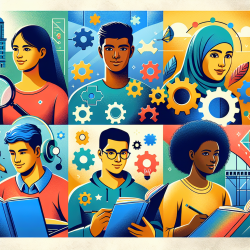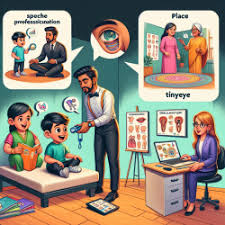Introduction
In the realm of speech-language pathology and mental health services, creating effective outcomes for children with intellectual disabilities and mental health challenges is paramount. The recent study, "Do Degrees Matter? Rethinking Workforce Development for Youth with Intellectual Disabilities and Mental Health Challenges," provides a compelling exploration of how innovative training can enhance workforce skills and improve service delivery.
Understanding the Workforce Crisis
The global workforce crisis in mental health services, particularly for youth with intellectual disabilities, is a pressing issue. The demand for direct care workers has nearly doubled over the past decade, yet wages remain low, and turnover rates are high. This shortage is exacerbated by the COVID-19 pandemic, highlighting the need for innovative solutions in workforce development.
Rethinking Workforce Development
The study challenges the traditional reliance on academic degrees as the primary criterion for employment in mental health services. Instead, it advocates for specialized training that equips both highly educated staff and those with less formal education with the necessary skills to deliver evidence-based practices (EBPs).
Participants in the study, regardless of their educational background, showed improved knowledge and understanding of EBPs after training. This finding underscores the potential of task-shifting strategies, where sophisticated care tasks are delegated to non-professionally trained individuals, thereby alleviating workforce pressures and unmet care demands.
Implementing Evidence-Based Practices
Evidence-based practices are crucial in delivering effective care. However, the study found that attitudes toward EBPs can vary, with some participants showing increased divergence in their views. This suggests a need for adaptable treatment strategies, especially when EBP models are unavailable for specific populations.
The training emphasized the importance of adapting EBPs to accommodate the unique needs of individuals with intellectual disabilities and mental health challenges. By focusing on adaptation rather than strict adherence to traditional models, practitioners can better meet the diverse needs of their clients.
Practical Implications for Practitioners
- Embrace task-shifting: Consider delegating certain care tasks to trained non-professionals to address workforce shortages.
- Focus on training: Invest in training programs that enhance understanding and implementation of EBPs, regardless of staff education level.
- Adapt and innovate: Be open to adapting EBPs to fit the unique needs of your clients, especially when traditional models are not applicable.
Encouraging Further Research
While the study provides valuable insights, it also highlights the need for further research. Future studies should explore the long-term impact of training on practice and client outcomes, as well as the role of informal education and lived experiences in workforce development.
Conclusion
The study "Do Degrees Matter? Rethinking Workforce Development for Youth with Intellectual Disabilities and Mental Health Challenges" offers a promising perspective on workforce development. By focusing on training and adaptation, practitioners can enhance their skills and improve outcomes for children with intellectual disabilities and mental health challenges.
To read the original research paper, please follow this link: Do Degrees Matter? Rethinking Workforce Development for Youth with Intellectual Disabilities and Mental Health Challenges.










